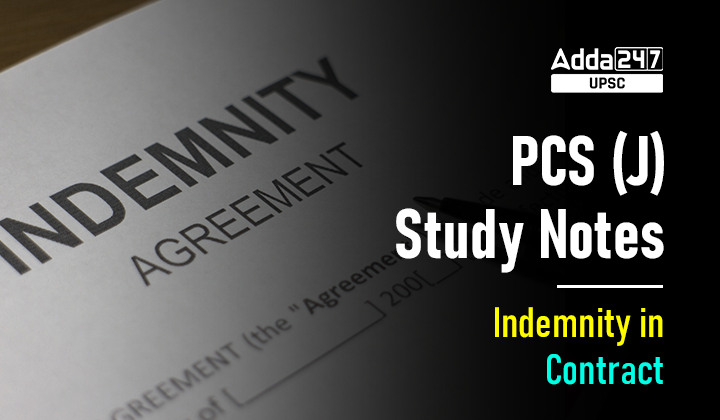Table of Contents
Indemnity under Contract Act 1872
Contract of Indemnity is defined under Section 124 of the Indian Contract Act, 1872 as “a contract by which one party guarantees to save the other person from loss caused to him by the action of the guarantor himself, or by the action of any other person.”
Prerequisites for Indemnity Contract Enforcement:
- Two parties
- There should be some loss
- The loss should be caused by the promisor or any other person.
- The indemnifier is liable for that loss only.
Since it is possible for one party to lack control over some aspects of the outward manifestation of a promise being fulfilled, a Contract of Indemnity is necessary. A party can be held liable for the activities of another if the other party’s performance was affected by factors beyond his control.
Enforcement of Contract of Indemnity
The conditions of an indemnification agreement can be enforced in court. The Indemnity Holder may seek reimbursement for any of the following: damages; legal fees associated with adjudication; any money paid in accordance with a Compromise Agreement. Compensation is determined by how much the promisee was reimbursed. Ideally, the indemnifier would be made aware of the lawsuit or would be made a party to it as a third party. Lastly, there is no requirement to provide proof of a breach or actual loss.
Rights of Indemnifier
The Indian Contract Act of 1872 did not protect the rights of an indemnifier It was determined in the case of Jaswant Singh v. Section of State that an indemnifier has the same rights as a surety under Section 141, meaning that he or she is entitled to benefit from any and all securities that the creditor may have against the principal debtor, regardless of whether or not the principal debtor was worried about those securities. If someone agrees to pay back a debt, that person will be considered to have succeeded to all rights and remedies that the original debtor had in order to protect himself from further loss or harm, or to receive compensation for those losses.
Upon making restitution for the losses or damages, the indemnifier takes on the role of the indemnified and has all the rights that the original indemnifier had in order to protect himself from liability.
The term “indemnification” refers to a contractual guarantee to cover the financial losses of one party. There is a provision stating that one side must indemnify the other.
अनुबंध अधिनियम 1872 के तहत क्षतिपूर्ति
क्षतिपूर्ति के अनुबंध को भारतीय अनुबंध अधिनियम, 1872 की धारा 124 के तहत परिभाषित किया गया है, “एक अनुबंध जिसके द्वारा एक पक्ष दूसरे व्यक्ति को स्वयं गारंटर की कार्रवाई या किसी अन्य व्यक्ति की कार्रवाई से हुए नुकसान से बचाने की गारंटी देता है। ।”
क्षतिपूर्ति अनुबंध प्रवर्तन के लिए पूर्वापेक्षाएँ:
(i) दो पक्ष
(ii) कुछ नुकसान होना चाहिए
(iii) नुकसान वचनदाता या किसी अन्य व्यक्ति के कारण होना चाहिए।
(iv) क्षतिपूर्तिकर्ता केवल उस नुकसान के लिए उत्तरदायी है।
चूंकि एक पक्ष के लिए किसी वादे के पूरा होने की बाहरी अभिव्यक्ति के कुछ पहलुओं पर नियंत्रण की कमी संभव है, इसलिए क्षतिपूर्ति का अनुबंध आवश्यक है। एक पार्टी को दूसरे पक्ष की गतिविधियों के लिए उत्तरदायी ठहराया जा सकता है यदि दूसरे पक्ष का प्रदर्शन उसके नियंत्रण से परे कारकों से प्रभावित होता है।
क्षतिपूर्ति के अनुबंध का प्रवर्तन
क्षतिपूर्ति समझौते की शर्तों को अदालत में लागू किया जा सकता है। क्षतिपूर्ति धारक निम्नलिखित में से किसी के लिए प्रतिपूर्ति की मांग कर सकता है: हर्जाना; न्यायनिर्णयन से जुड़ी कानूनी फीस; समझौता समझौते के अनुसार भुगतान किया गया कोई भी पैसा। मुआवजा इस बात से निर्धारित होता है कि वादा करने वाले को कितनी प्रतिपूर्ति की गई थी। आदर्श रूप से, क्षतिपूर्तिकर्ता को मुकदमे से अवगत कराया जाएगा या तीसरे पक्ष के रूप में उसे एक पक्ष बनाया जाएगा। अंत में, उल्लंघन या वास्तविक नुकसान का प्रमाण देने की कोई आवश्यकता नहीं है।
क्षतिपूर्ति के अधिकार
1872 के भारतीय अनुबंध अधिनियम ने एक क्षतिपूर्तिकर्ता के अधिकारों की रक्षा नहीं की जसवंत सिंह बनाम राज्य की धारा के मामले में यह निर्धारित किया गया था कि एक क्षतिपूर्तिकर्ता के पास धारा 141 के तहत एक जमानतदार के समान अधिकार हैं, जिसका अर्थ है कि वह हकदार है किसी भी और सभी प्रतिभूतियों से लाभ जो लेनदार के पास मुख्य देनदार के खिलाफ हो सकता है, भले ही प्रमुख देनदार उन प्रतिभूतियों के बारे में चिंतित था या नहीं। यदि कोई ऋण चुकाने के लिए सहमत होता है, तो उस व्यक्ति को उन सभी अधिकारों और उपायों के लिए सफल माना जाएगा जो मूल देनदार के पास खुद को और नुकसान या नुकसान से बचाने के लिए, या उन नुकसानों के लिए मुआवजा प्राप्त करने के लिए थे।
नुकसान या क्षति के लिए क्षतिपूर्ति करने पर, क्षतिपूर्तिकर्ता क्षतिपूर्ति की भूमिका निभाता है और उसके पास वे सभी अधिकार होते हैं जो मूल क्षतिपूर्तिकर्ता के पास स्वयं को दायित्व से बचाने के लिए थे।
शब्द “क्षतिपूर्ति” एक पक्ष के वित्तीय नुकसान को कवर करने के लिए एक संविदात्मक गारंटी को संदर्भित करता है। एक प्रावधान है जिसमें कहा गया है कि एक पक्ष को दूसरे पक्ष को हर्जाना देना होगा।



 TSPSC Group 1 Question Paper 2024, Downl...
TSPSC Group 1 Question Paper 2024, Downl...
 TSPSC Group 1 Answer key 2024 Out, Downl...
TSPSC Group 1 Answer key 2024 Out, Downl...
 UPSC Prelims 2024 Question Paper, Downlo...
UPSC Prelims 2024 Question Paper, Downlo...






